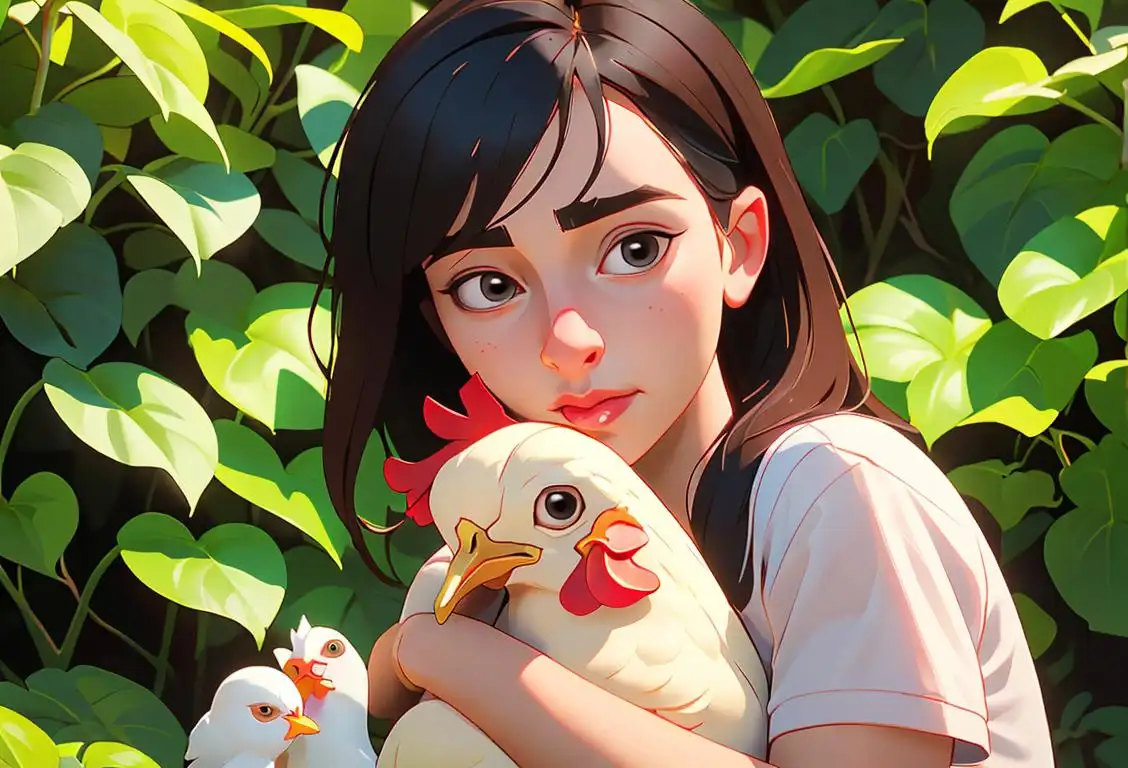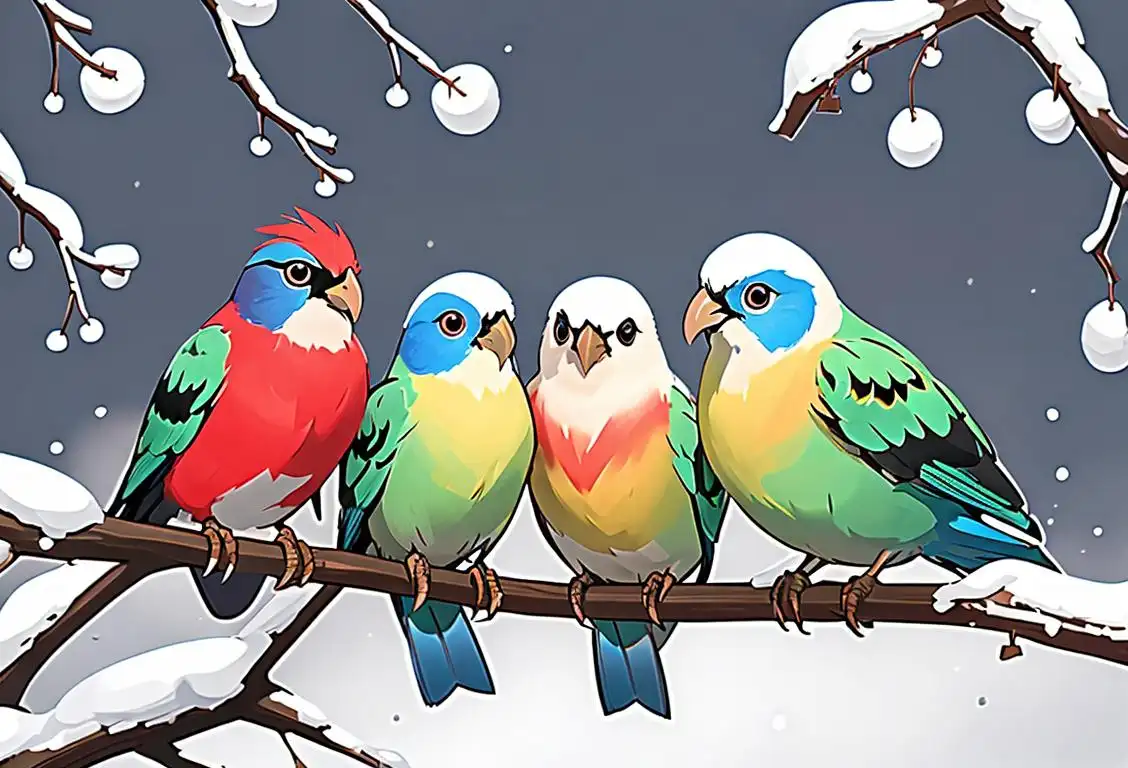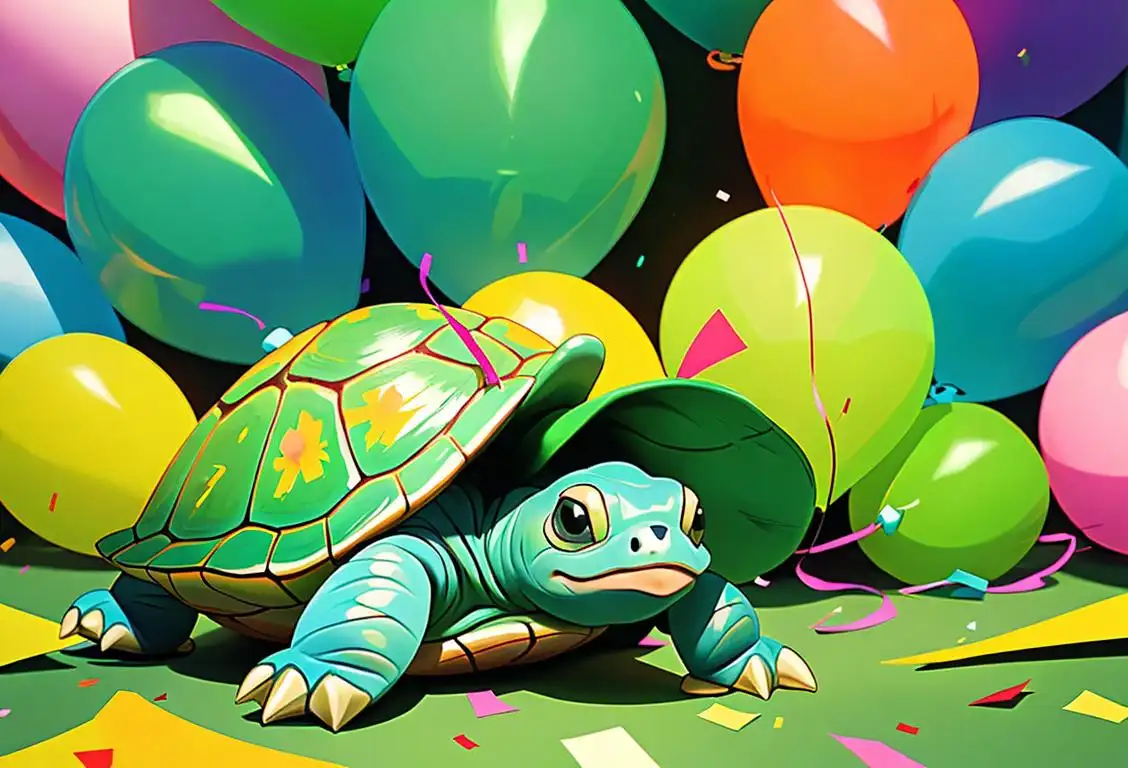National Chicken Kissing Day

Welcome to the wacky world of National Chicken Kissing Day! Get ready to pucker up and show some love to your feathery friends.
When is Chicken Kissing Day?
It's national chicken kissing day on the 6th July.
The Origins of National Chicken Kissing Day
On this delightful day, we celebrate the unique bond between humans and chickens. While the exact origin of National Chicken Kissing Day is somewhat murky, it's safe to say that it grew out of the internet culture's love for unusual and hilarious holidays.
Chickens, with their fluffy feathers and quirky personalities, have captured the hearts of people all over the world. And let's not forget about those freshly laid eggs; they're simply clucking delicious!
A Hilarious Celebration Worth Documenting
Although National Chicken Kissing Day might not be the most widely recognized holiday, it definitely deserves a place in the spotlight. It's a day where chicken enthusiasts from all walks of life come together to express their affection for these remarkable creatures.
So how does one celebrate this feathered festivity? Well, it's quite simple, really. Just find a friendly chicken, give it a gentle smooch, and let the magic unfold. Whether you're a farm owner, an agricultural enthusiast, or just an animal lover, National Chicken Kissing Day provides the perfect excuse to indulge in some delightful chicken kisses and spread the joy of poultry smooches to the world.
Chicken Kissing Wisdom and Fun Facts
Did you know that some chicken species have over 24 distinct vocalizations? So, the next time you find yourself sharing a tender moment with a clucking companion, pay attention to the sweet serenade of their symphony.
Remember, we're not suggesting any funny business here. Chickens deserve our respect, care, and affection, just like any other creature. So, keep those kisses friendly and platonic!
History behind the term 'Chicken Kissing'
1912
From literal to metaphorical
The term 'chicken kissing' first emerged in the early 20th century. Initially, it was used literally to describe the act of kissing chickens as part of rural farming practices. People believed that kissing a chicken would bring good luck and ensure a bountiful harvest. However, this practice gradually evolved to take on a metaphorical meaning.
1920
The Rise of Chicken Kissing
In the early 1920s, a peculiar trend started to emerge in rural communities across the United States. People began engaging in a rather unusual activity - kissing chickens. This bizarre practice involved individuals puckering up and smooching the beaks of chickens. While it may seem strange to us today, at the time, chicken kissing was seen as a form of entertainment and an eccentric way to demonstrate affection for animals.
1925
The First Encounter
In 1925, the term 'chicken kissing' was first mentioned as a playful expression among farmers in rural communities. It referred to the act of kissing a chicken as a sign of good luck and prosperity. People believed that by kissing a chicken, they would ensure a bountiful harvest and healthy livestock. This practice became a tradition passed down through generations in agricultural regions.
1940
Hollywood's Twist
By the 1940s, the term 'chicken kissing' had caught the attention of Hollywood scriptwriters. It featured in several comedy films, where characters would humorously engage in this quirky tradition. The movies portrayed the act as a comedic superstition that brought unexpected consequences—an amusing twist to an otherwise ordinary tradition. This exposure contributed to the popularization of the term beyond rural communities.
1950
Symbol of affection
In the 1950s, 'chicken kissing' started to gain popularity as a symbol of affection between couples. It became a playful way of expressing love and tenderness towards one another. The term began to be used in popular culture, especially in romantic comedies and novels, further solidifying its association with romantic relationships.
1925
Chicken Kissing Contests
By the mid-1920s, the novelty of chicken kissing had gained considerable attention. To capitalize on the growing interest, chicken kissing contests started popping up at fairs and local events. Participants would compete to see who could kiss the most chickens in a given time period. These contests became immensely popular, drawing large crowds and generating excitement among the local communities. It became a fun and lighthearted activity that brought people together.
1960
Chicken Kissing Contests
In the 1960s, 'chicken kissing' took a competitive turn. Various local fairs and festivals started organizing chicken kissing contests, where participants would compete to kiss as many chickens as possible in a given time. These events drew large crowds and became a source of entertainment and amusement. Spectators were enthralled by the speed, skill, and bravery of contestants as they puckered up to peck.
1972
Integration into lexicon
By the 1970s, 'chicken kissing' had become firmly integrated into the English lexicon. It was adopted by the younger generation as a slang term for kissing, particularly in casual or lighthearted contexts. The term found its way into everyday conversations and even featured in popular song lyrics and advertisements, further solidifying its place in popular culture.
1930
A Symbol of Luck and Prosperity
As chicken kissing continued to capture people's fascination, it started to acquire symbolic meaning. Kissing a chicken was believed to bring good luck and prosperity to individuals and their families. The act of bestowing a kiss on a chicken was thought to ensure bountiful harvests and safeguard against misfortune. Consequently, chicken kissing became associated with folklore and superstitions, further cementing its cultural significance.
1990
Embracing humor and satire
During the 1990s, 'chicken kissing' took on a humorous and satirical connotation. It became a source of entertainment and amusement, often used in comedic sketches, stand-up routines, and internet memes. The term became synonymous with silly or awkward situations, adding to its versatility as a cultural reference.
1945
The Decline of Chicken Kissing
In the aftermath of World War II, as urbanization and technological advancements increased, the tradition of chicken kissing slowly began to fade away. The practice lost its appeal in modern society, becoming less prevalent and eventually relegated to obscurity. While the heyday of chicken kissing may have passed, it remains as a curious relic of a bygone era and a testament to the peculiarities of cultural fads.
1995
Chickens as Celebrities
By the mid-1990s, chickens gained celebrity status in many regions. The term 'chicken kissing' gained further prominence as people began sharing videos and photos online of their chicken-kissing endeavors. This trend was fueled by the rise of the internet and social media platforms, allowing people to easily showcase their unique interactions with chickens. 'Chicken kissing' became a viral sensation, captivating audiences globally.
2015
Chicken Kissing as a Symbol
In recent years, 'chicken kissing' has evolved into a symbolic act of courage and fearlessness. It has become a metaphor for embracing the unknown, taking risks, and challenging oneself. The term is now occasionally used in motivational speeches or self-help literature to encourage individuals to step out of their comfort zones and face challenges with bravery, just as one would approach kissing a chicken.
Present
Continued cultural presence
Today, 'chicken kissing' continues to be a part of popular culture. It has found its way into online discussions, social media, and even advertising campaigns. The term serves as a reminder of the ever-evolving language and the way in which expressions and meanings can change over time. Whether used seriously or in jest, 'chicken kissing' remains a lighthearted and playful term that continues to captivate people's imaginations.
Did you know?
Did you know that chickens have a great memory? They can recognize different human faces and even remember if you've been kind or not! So, be on your best behavior when you're around your chicken friends.Tagged
romance fun animalsFirst identified
6th July 2016Most mentioned on
6th July 2016Total mentions
8Other days
Chicken Kissing Day
Touch The Butt Day
Iloveyou Day
Kiss A Ginger Day
Bird Day
Turtle Day
Compliment Day
Dance Day
Single Ppl Day
Honesty Day








